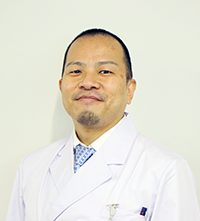
Staff
-

ProfessorKen SugimotoKen Sugimoto
-
Associate ProfessorHiroyuki KadoyaHiroyuki Kadoya
-
Assistant ProfessorMaki AkiyamaMaki Akiyama
-
Assistant Professor with Special AssignmentToshiya YamamotoToshiya Yamamoto
-
InstructorEimei OkamotoEimei Okamoto
-
InstructorHaruka TakenouchiHaruka Takenouchi
Focus and Overview of Education
Geriatrics is a specialized field that focused on health condition of older adults and on establishing appropriate preventive and therapeutic strategies for functional impairment and disease. Rather than simply treating all older adults, we mainly provide medical care for those who need a "geriatric approach," with complaints such as "I don't know which department to see because of multiple chronic diseases ('multimorbidity')" or "I don't know the exact name of the disease, but I'm not feeling well", that is, the older adults with frailty. We also provide nursing care, home medical care, and terminal care based on this approach.
The department of Geriatric and General Medicine was established in October 2020. The department’s theme is to identify and solve the issues in older adults that affect activities of daily living (ADL) and prognoses. These issues cannot be dealt with only by organ-specific medical care, such as geriatric syndrome, frailty, 'multimorbidity', and polypharmacy using geriatric approaches such as a Comprehensive Geriatric Assessment (CGA) and evaluation of physical function through multidisciplinary collaboration. As for the research, we are conducting basic and clinical research aimed at establishing diagnostic procedures, prevention, and treatment approaches for frailty and sarcopenia.
In a super-aging society, the significance of geriatrics has been increasing day by day. Our department aims to train doctors and multidisciplinary staff who can "see the older adults"- who are open with older adults with sincerity, and who can contribute to the realization of healthy longevity.
Research Fields and Major Research Themes
- Construction of disease-specific frailty registry and search for biomarkers
- Verification of the effects of drugs that can prevent or bring recovering from frailty
- Developing nutritional and exercise strategies to prevent sarcopenia and suppress its progression
- Developing a new diagnostic method and interventional approaches for sarcopenia using muscle ultrasonography
- Establishment of control strategies for geriatric syndromes focusing on myokine
